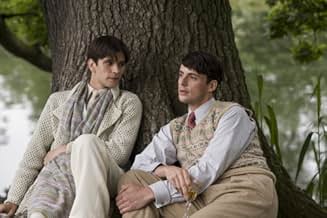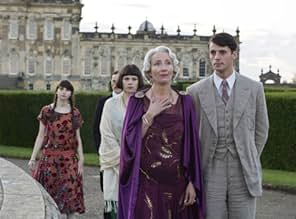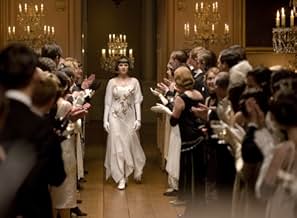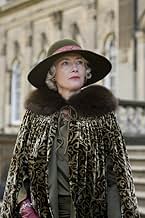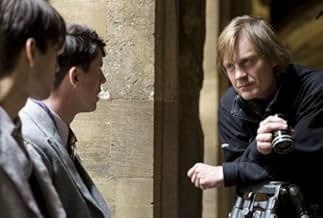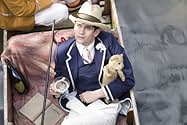VALUTAZIONE IMDb
6,6/10
13.982
LA TUA VALUTAZIONE
Una storia di amore proibito e perdita di innocenza in Inghilterra prima della seconda guerra mondiale.Una storia di amore proibito e perdita di innocenza in Inghilterra prima della seconda guerra mondiale.Una storia di amore proibito e perdita di innocenza in Inghilterra prima della seconda guerra mondiale.
- Regia
- Sceneggiatura
- Star
- Premi
- 11 candidature totali
Recensioni in evidenza
It's attributed to just about everybody - from Ginger Rogers to Milan Kundera - and it sounds so right: "There are no small parts, only small actors."
If you want proof and a real understanding of the adage, revisit "Brideshead Revisited," and behold the miracle of Emma Thompson's Lady Marchmain, sucking the life out of anything and anybody she touches, and Michael Gambon's delightfully dissolute Lord Marchmain. She has about 10 minutes on the screen, he perhaps four, and yet their characters will follow you out of the theater, and stay with you at length.
Thompson's work is especially dazzling because the mean, sanctimonious character is so clearly alien to the actress (in fact, I suspected miscasting when I first heard of her assignment) and also as the character is so exaggerated, almost a caricature. And yet, Thompson gives the challenge her all, and walks away with it; the performance has Best Supporting Actress written all over it.
It's difficult to believe that the man you see as Marchmain is the same actor who was the "Singing Detective" (of the superb BBC series, not the Robert Downey Jr. mishap). Gambon has a range as wide as all outdoors, and you never ever see effort in the performance. His amiable Marchmain - subtly hinting at a complex character under the surface - has a physical similarity to Gambon's Uncle Vanya on the London stage, but otherwise, it's a unique creation.
What else is there to this new "edition" of "Brideshead"? A great deal, but only if you're among those who missed both Evelyn Waugh's novel and the wonderful Granada TV realization 27 long years ago - Irons! Gielgud! Olivier! - how can you compete with that? So, if it's a first-time visit, see the movie by all means; if you can recite lines from the book or the TV series, you can survive without the new version.
In 135 minutes, the film is handling well what the TV series did so completely in - yes - 13 HOURS. Obviously, except for the basic story line (script by Jeremy Brock, of "The Last King of Scotland"), this is a different kind of animal, still "leisurely" enough, but unable to luxuriate in the smallest details as the series did. The director is Julian Jarrold, and he is doing far better than in his recent "Becoming Jane," keeps the story moving in a smooth fashion.
As to the leading roles in the film, they are all well acted, but without great impact. Matthew Goode is Charles Ryder, the focal character; Ben Whishaw is the slightly over-flamboyant Sebastian Flyte (who needs understating more than exaggerating - Anthony Andrews' performance in the TV series was exactly right); Hayley Atwell is Sebastian's sister (and rival for Charles' affection).
One amazing thing about "Brideshead" is how this story from a different time, about characters from a different world, remains interesting and meaningful. It's almost as if Waugh's work was bulletproof - not that these filmmakers were less than respectful to the author. A better test would be a Eurotrash opera version, heaven forfend.
If you want proof and a real understanding of the adage, revisit "Brideshead Revisited," and behold the miracle of Emma Thompson's Lady Marchmain, sucking the life out of anything and anybody she touches, and Michael Gambon's delightfully dissolute Lord Marchmain. She has about 10 minutes on the screen, he perhaps four, and yet their characters will follow you out of the theater, and stay with you at length.
Thompson's work is especially dazzling because the mean, sanctimonious character is so clearly alien to the actress (in fact, I suspected miscasting when I first heard of her assignment) and also as the character is so exaggerated, almost a caricature. And yet, Thompson gives the challenge her all, and walks away with it; the performance has Best Supporting Actress written all over it.
It's difficult to believe that the man you see as Marchmain is the same actor who was the "Singing Detective" (of the superb BBC series, not the Robert Downey Jr. mishap). Gambon has a range as wide as all outdoors, and you never ever see effort in the performance. His amiable Marchmain - subtly hinting at a complex character under the surface - has a physical similarity to Gambon's Uncle Vanya on the London stage, but otherwise, it's a unique creation.
What else is there to this new "edition" of "Brideshead"? A great deal, but only if you're among those who missed both Evelyn Waugh's novel and the wonderful Granada TV realization 27 long years ago - Irons! Gielgud! Olivier! - how can you compete with that? So, if it's a first-time visit, see the movie by all means; if you can recite lines from the book or the TV series, you can survive without the new version.
In 135 minutes, the film is handling well what the TV series did so completely in - yes - 13 HOURS. Obviously, except for the basic story line (script by Jeremy Brock, of "The Last King of Scotland"), this is a different kind of animal, still "leisurely" enough, but unable to luxuriate in the smallest details as the series did. The director is Julian Jarrold, and he is doing far better than in his recent "Becoming Jane," keeps the story moving in a smooth fashion.
As to the leading roles in the film, they are all well acted, but without great impact. Matthew Goode is Charles Ryder, the focal character; Ben Whishaw is the slightly over-flamboyant Sebastian Flyte (who needs understating more than exaggerating - Anthony Andrews' performance in the TV series was exactly right); Hayley Atwell is Sebastian's sister (and rival for Charles' affection).
One amazing thing about "Brideshead" is how this story from a different time, about characters from a different world, remains interesting and meaningful. It's almost as if Waugh's work was bulletproof - not that these filmmakers were less than respectful to the author. A better test would be a Eurotrash opera version, heaven forfend.
Among many of the most prestigious literature selections, not to mention mini-series, Brideshead Revisited not only wasn't on my radar, I didn't even know if it would be the kind of well-regarded literature or mini-series I intended to watch. But as this newly revised picture, now a mere 136 minutes vs 10 hours, it looked interesting if only as a kind of "handsomely made" picture (you know the kind, along the lines of Atonement for recent comparison). I was also intrigued by the allure of a huge, sprawling mansion here called Brideshead, as it reminded me of Alain Resnais's film Last Year at Marienbad and how memories and recollections and lost love and hope is explored in the spaces of this dark, cold region of exquisite luxury. Some of that is explored in this film, and some of it... isn't.
It's for the most part a fairly tragic story of a young man, Charles (Matthew Goode, charming and suave but also subtle and down-beat, a really fine turn), who enrolls at Oxford and meets a meek/'fey' guy named Sebastian, and through him he's introduced (reluctantly in point of fact) to Sebastian's family, including his sister Julia, and his very cold and strident mother (Emma Thompson). Sebastian really wants Charles all for himself - it's a friendship that goes just a nose-hair's length into admitting homosexuality but never really goes that far despite all appearances to the contrary - but he becomes apart of the fold, and as well falling deeply in love with Julia against 'other' wishes (mostly the matriarch's over Charles's religion).
There's a lot of the fragility of the bourgeois on display here, the arrogance and detachment that's shown very closely by the director for maximum effect. Unlike a Resnais he's not about to get too experimental with the camera; he's a careful craftsman more often than not, allowing for just enough wonderment of the whole Brideshead atmosphere to really sink into how it could be a double-edged sword of perception. And as is bound to happen with material this sprawling (at one point time jumps back 10 years, then ahead 4 years, until we kind of know where we are), a lot seems to be cut out. While it altogether makes a coherent and entertaining enough picture, I wonder how much more of a benefit this would make as an epic, where we are absorbed more fully with the Oxford school or Charles and Sebastian or even the parents (who, thankfully, are played wonderfully here by cold-as-ice Thompson and fascinatingly guilt-ridden and subtle Michael Gambon), or how the wealth structure even works here.
Indeed, I found myself not so much involved with the Charles/Sebastian stuff, even as it's fairly well-acted and well-shot enough, as I was with the themes of religion raised in the picture. This caught me off guard and hinted at something deeper being expounded upon. Yet, again, we get just tastes of what's offered more than likely in the original text, tastes that are powerful like a 'last-rites' argument, and the tortured state of being raised from the cradle with an intense, overbearing Catholic conscience.
It's for the most part a fairly tragic story of a young man, Charles (Matthew Goode, charming and suave but also subtle and down-beat, a really fine turn), who enrolls at Oxford and meets a meek/'fey' guy named Sebastian, and through him he's introduced (reluctantly in point of fact) to Sebastian's family, including his sister Julia, and his very cold and strident mother (Emma Thompson). Sebastian really wants Charles all for himself - it's a friendship that goes just a nose-hair's length into admitting homosexuality but never really goes that far despite all appearances to the contrary - but he becomes apart of the fold, and as well falling deeply in love with Julia against 'other' wishes (mostly the matriarch's over Charles's religion).
There's a lot of the fragility of the bourgeois on display here, the arrogance and detachment that's shown very closely by the director for maximum effect. Unlike a Resnais he's not about to get too experimental with the camera; he's a careful craftsman more often than not, allowing for just enough wonderment of the whole Brideshead atmosphere to really sink into how it could be a double-edged sword of perception. And as is bound to happen with material this sprawling (at one point time jumps back 10 years, then ahead 4 years, until we kind of know where we are), a lot seems to be cut out. While it altogether makes a coherent and entertaining enough picture, I wonder how much more of a benefit this would make as an epic, where we are absorbed more fully with the Oxford school or Charles and Sebastian or even the parents (who, thankfully, are played wonderfully here by cold-as-ice Thompson and fascinatingly guilt-ridden and subtle Michael Gambon), or how the wealth structure even works here.
Indeed, I found myself not so much involved with the Charles/Sebastian stuff, even as it's fairly well-acted and well-shot enough, as I was with the themes of religion raised in the picture. This caught me off guard and hinted at something deeper being expounded upon. Yet, again, we get just tastes of what's offered more than likely in the original text, tastes that are powerful like a 'last-rites' argument, and the tortured state of being raised from the cradle with an intense, overbearing Catholic conscience.
The Granada people got it right in 1979 when they set out to film "Brideshead Revisited." They realized that Evelyn Waugh's great novel could not be done justice in a single film of two or even three hours. It had to be made into an extended mini-series. Thus, the great 11-part TV series of 1981 - the first and only great film version of Waugh's novel.
Yet, in 2008, BBC Films thought it was time for a remake. The result is this film adaptation. It lasts just over two hours. It skims over or skips characters. It changes the focus, and thus the story. It misses the essence of Waugh's story completely. So, it's more proper to call this a major revision - a revised story based on Waugh's novel.
Even Emma Thompson as Lady Marchmain and Michael Gambon as Lord Marchmain can't lift this revised story to an acceptable imitation. Apparently, because the story is so profound, BBC films chose to promote this as a remake of the TV series from Waugh' great novel. That being the case, one is led naturally to comparison. Thus, this film fails.
Still, for some fair acting by the cast, I give it five stars as though it were a different story entirely. After all, the cast can't be held accountable for the plot. Although Thompson's almost muted performance hints that she may realize she's in a far inferior work that has borrowed a great title.
Yet, in 2008, BBC Films thought it was time for a remake. The result is this film adaptation. It lasts just over two hours. It skims over or skips characters. It changes the focus, and thus the story. It misses the essence of Waugh's story completely. So, it's more proper to call this a major revision - a revised story based on Waugh's novel.
Even Emma Thompson as Lady Marchmain and Michael Gambon as Lord Marchmain can't lift this revised story to an acceptable imitation. Apparently, because the story is so profound, BBC films chose to promote this as a remake of the TV series from Waugh' great novel. That being the case, one is led naturally to comparison. Thus, this film fails.
Still, for some fair acting by the cast, I give it five stars as though it were a different story entirely. After all, the cast can't be held accountable for the plot. Although Thompson's almost muted performance hints that she may realize she's in a far inferior work that has borrowed a great title.
Is this film a worthy interpretation of "Brideshead Revisited"? Well, up to a point, Lord Copper, as another one of Evelyn Waugh's characters was wont to say.
First, scriptwriter Andrew Davies, a past master of adaptation of great and not-so great literary works, has put the focus on the Charles and Julia love story rather than the Charles and Sebastian 'romantic friendship' as Cara, Lord Marchmain's Italian mistress puts it. The religious aspect is dealt with almost incidentally.
Second, Lady Marchmain, as played by Emma Thompson, is a very grim person with total emotional control over her children and whose particular Christian beliefs means that she is indifferent to their suffering as to her this life is a mere precursor to the glorious afterlife the same attitude as a 9/11 hi-jacker in fact. She has none of the sweetness that Claire Bloom brought to the 1981 TV series.
Third, some of the performances owe a good deal to those in the TV series, especially Matthew Goode as Charles who has an uncanny likeness to Jeremy Irons. And of course Castle Howard reprises its role as Brideshead. Some characters were reduced to ciphers; for example Bridey who played by Simon Jones stole several scenes in 1981 but the part is reduced to a non-entity here. Michael Gambon, a consummate actor, gives us a new take on Lord Marchmain to compare with Lawrence Olivier's earlier version.
Overall, though, I was left with the impression this film has not much to say which is new. Like the recent feature film version of "Pride and Prejudice", it gives a broad outline of the story but misses out much of the rich context provided by the minor characters. Oh, read the book instead.
First, scriptwriter Andrew Davies, a past master of adaptation of great and not-so great literary works, has put the focus on the Charles and Julia love story rather than the Charles and Sebastian 'romantic friendship' as Cara, Lord Marchmain's Italian mistress puts it. The religious aspect is dealt with almost incidentally.
Second, Lady Marchmain, as played by Emma Thompson, is a very grim person with total emotional control over her children and whose particular Christian beliefs means that she is indifferent to their suffering as to her this life is a mere precursor to the glorious afterlife the same attitude as a 9/11 hi-jacker in fact. She has none of the sweetness that Claire Bloom brought to the 1981 TV series.
Third, some of the performances owe a good deal to those in the TV series, especially Matthew Goode as Charles who has an uncanny likeness to Jeremy Irons. And of course Castle Howard reprises its role as Brideshead. Some characters were reduced to ciphers; for example Bridey who played by Simon Jones stole several scenes in 1981 but the part is reduced to a non-entity here. Michael Gambon, a consummate actor, gives us a new take on Lord Marchmain to compare with Lawrence Olivier's earlier version.
Overall, though, I was left with the impression this film has not much to say which is new. Like the recent feature film version of "Pride and Prejudice", it gives a broad outline of the story but misses out much of the rich context provided by the minor characters. Oh, read the book instead.
The greatness of the original Brideshead Revisited was in the luxury of being able to transpose a very complicated emotional and intellectual book into words. It succeeded in this, but only just, due to superb direction, photography and script which, even in its sparseness, only just allowed the successful transition to film. The problem with anything shorter is that, if it took Mortimer so many episodes to get it right, then there are very few writers who could even get near in under 4 hours, if that. So lets stop beating about the bush. This is a sound reproduction of the calender plot but after that it is not Brideshead Revisited. Call it by another name and I will laud it. It brings in a strong homosexual element and a early sexual attraction between Charles Ryder and Miss Flyte. With that everything becomes unbalanced. Motivations change. The beauty of the original is that it hinted at ????something (a je ne sais quoi) and it was that and the ever strengthening Catholic awareness of family that made this film so fascinating. The original's masterpiece was the script supported by the cine photography. That has been lost. But taken as is, a pretty and interesting film which seems to be loosely based on an early fifties work by Waugh.
Lo sapevi?
- QuizDame Emma Thompson threatened to quit this movie if the producers persisted in pushing actress Hayley Atwell to lose weight. Atwell said that Harvey Weinstein even insulted her over lunch by saying: "You look like a fat pig on-screen. Stop eating so much."
- BlooperAfter the dinner, at which Charles first meets Lady Marchmain, the family go to pray in the private chapel. The ladies, as Roman Catholics, would have covered their heads with a scarf or a veil.
- Citazioni
Sebastian Flyte: I asked too much of you. I knew it all along, really. Only God can give you that sort of love.
I più visti
Accedi per valutare e creare un elenco di titoli salvati per ottenere consigli personalizzati
Dettagli
- Data di uscita
- Paesi di origine
- Sito ufficiale
- Lingue
- Celebre anche come
- Brideshead Revisited
- Luoghi delle riprese
- Aziende produttrici
- Vedi altri crediti dell’azienda su IMDbPro
Botteghino
- Budget
- 20.000.000 USD (previsto)
- Lordo Stati Uniti e Canada
- 6.432.256 USD
- Fine settimana di apertura Stati Uniti e Canada
- 339.616 USD
- 27 lug 2008
- Lordo in tutto il mondo
- 13.451.186 USD
- Tempo di esecuzione2 ore 14 minuti
- Colore
- Mix di suoni
- Proporzioni
- 2.35 : 1
Contribuisci a questa pagina
Suggerisci una modifica o aggiungi i contenuti mancanti

Divario superiore
By what name was Ritorno a Brideshead (2008) officially released in India in English?
Rispondi

